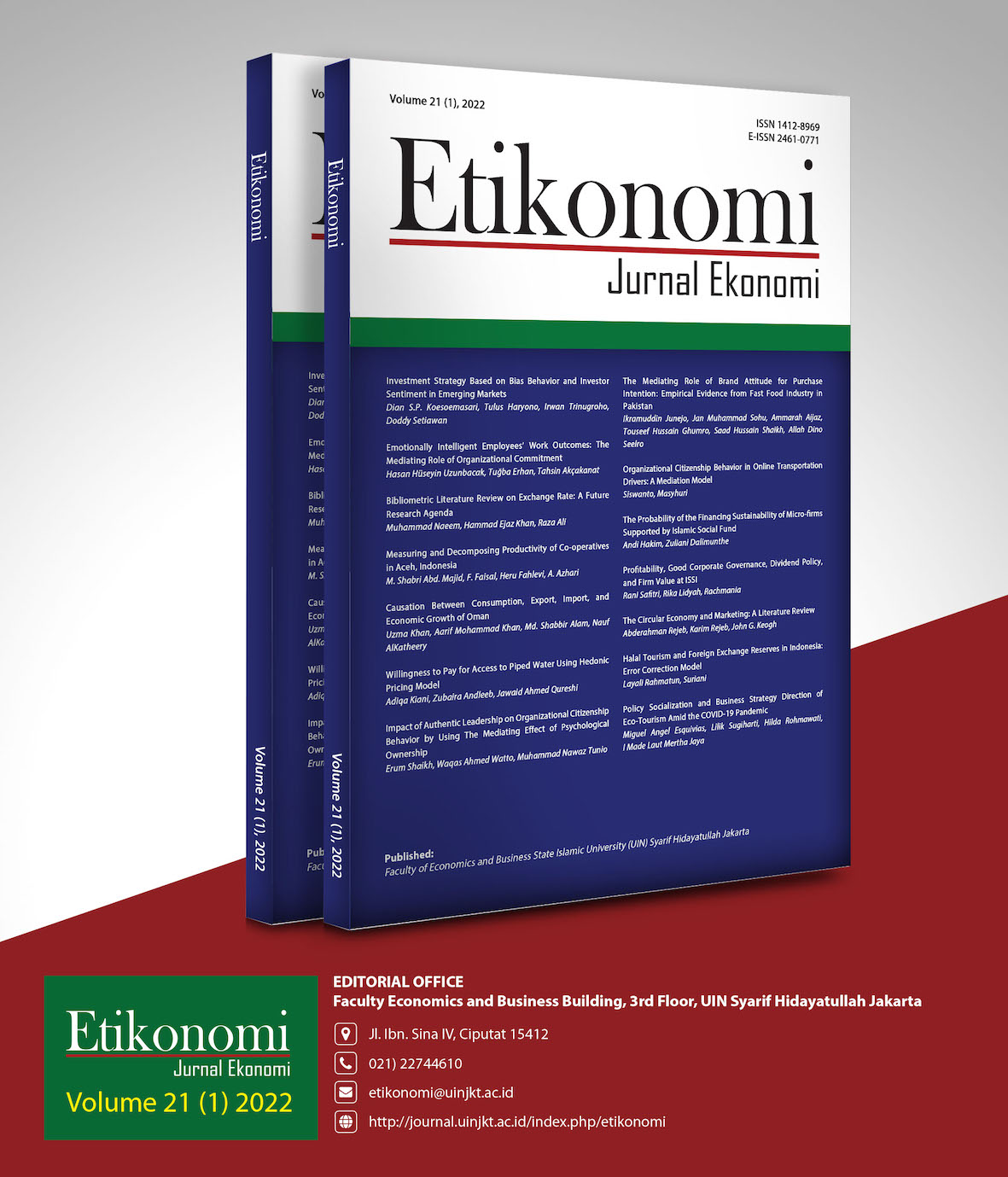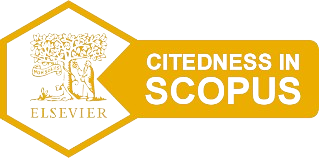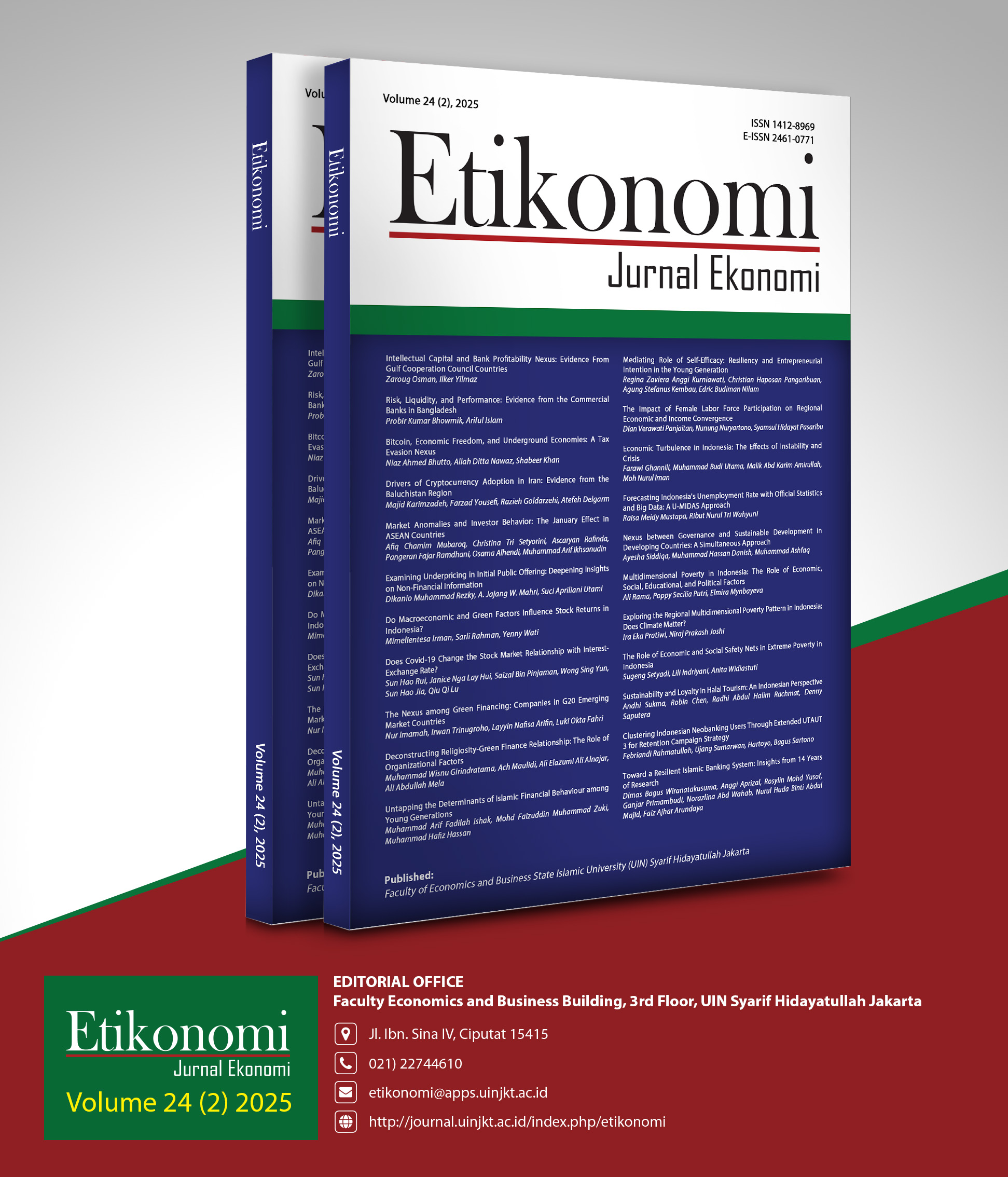Organizational Citizenship Behavior in Online Transportation Drivers: A Mediation Model
DOI:
https://doi.org/10.15408/etk.v21i1.22665Keywords:
job involvement, organizational citizenship behavior, organizational commitmentAbstract
The research originality is the use of organizational commitment variable as mediation and object of research in transportation start-up companies that have not been studied before. The objective of this research was to examine the mediating role of organizational commitment between job involvement and organizational citizenship behavior (OCB). This research is used to develop knowledge about human resource management in start-up companies with partner status. The partial least square structural equation modeling technique is used to test quantitative data and hypotheses. The result of this research is that organizational commitment does not mediate the effect of job involvement on organizational citizenship behavior. Furthermore, job involvement has a significant positive effect on OCB. This study also provides the practical implication that employees who have a high commitment do not make them work extra because the status as partners is very different, so further discussion is needed.
How to Cite:
Siswanto., & Masyhuri. (2022). Organizational Citizenship Behavior in Online Transportation Drivers: A Mediation Model. Etikonomi, 21(1), 113-126. https://doi.org/10.15408/etk.v21i1.22665.
Downloads
References
Arifin, M., & Puteri, H. (2019). Personality, Grit and Organizational Citizenship Behavior at Vocational Higher Education: The Mediating Role of Job Involvement. Journal of Social Studies Education Research, 10(2), 168–187.
Bagozzi, R. P., & Yi, Y. (2012). Specification, Evaluation, and Interpretation of Structural Equation Models. Journal of the Academy of Marketing Science, 40(1), 8–34. https://doi.org/10.1007/s11747-011-0278-x.
Bies, R. J. (1989). Organizational Citizenship Behavior: The Good Soldier Syndrome. Lexington: New York.
Chin, W. W., & Newsted, P. R. (1999). Structural Equation Modeling Analysis with Small Samples Using Partial Least Squares. In Hoyle, R. H (Ed). Statistical Strategies for Small Sample Research (pp. 307-341). Sage Publications. Thousand Oaks.
Chu, C.-I., Lee, M.-S., Hsu, H.-M., & Chen, I.-C. (2005). Clarification of the Antecedents of Hospital Nurse Organizational Citizenship Behavior–an Example from a Taiwan Regional Hospital. The Journal of Nursing Research: JNR, 13(4), 313–324.
Chughtai, A. A. (2008). Impact of Job Involvement on In-Role Job Performance and Organizational Citizenship Behaviour. Journal of Behavioral and Applied Management, 9(2), 169–183.
Cohen, A. (2006). The Relationship Between Multiple Commitments and Organizational Citizenship Behavior in Arab and Jewish Culture. Journal of Vocational Behavior, 69(1), 105–118. https://doi.org/10.1016/j.jvb.2005.12.004.
Coulter, M. (2010). Manajemen. Indeks: Jakarta
Dierdorff, E. C., Rubin, R. S., & Ellington, J. K. (2021). Interpersonal Skills, Role Cognitions, and OCB: Exploring Mediating Mechanisms and Contextual Constraints on Role Enactment. Journal of Vocational Behavior, 129, 103604. https://doi.org/10.1016/j.jvb.2021.103604.
Dimitriades, Z. S. (2007). The Influence of Service Climate and Job Involvement on Customer-Oriented Organizational Citizenship Behavior in Greek Service Organizations: A Survey. Employee Relations, 29(5), 469-491. https://doi.org/10.1108/01425450710776290.
Geisser, S. (1975). The Predictive Sample Reuse Method with Applications. Journal of the American Statistical Association, 70(350), 320–328. https://doi.org/2285815.
Gupta, M., Shaheen, M., & Reddy, P. K. (2017). Impact of Psychological Capital on Organizational Citizenship Behavior: Mediation by Work Engagement. Journal of Management Development, 36(7), 973-983. http://doi.org/10.1108/JMD-06-2016-0084.
Hair, J., Black, W., & Babin, B. (2008). Anderson. Multivariate Data Analysis 5th Edition. Prentice Hall International Inc. New Jersey.
Hair Jr, J. F., Sarstedt, M., Ringle, C. M., & Gudergan, S. P. (2017). Advanced Issues in Partial Least Squares Structural Equation Modeling. Sage Publications. New York.
Hayes, A. F. (2017). Introduction to Mediation, Moderation, and Conditional Process Analysis: A Regression-Based Approach. Guilford Publications. New York.
Henseler, J., Ringle, C. M., & Sarstedt, M. (2015). A New Criterion for Assessing Discriminant Validity in Variance-based Structural Equation Modeling. Journal of the Academy of Marketing Science, 43(1), 115–135. https://doi.org/10.1007/s11747-014-0403-8.
Hussein, N., & Tahir, N. K. M. (2019). Job Satisfaction, Job Involvement and Life Satisfaction among Nurses in Malaysia. Malaysian Journal of Business and Economics (MJBE), Special Edition(1), 61-70.
Kinicki, R. K.-A., & Kreitner, R. (2014). Perilaku Organisasi. Salemba Empat. Jakarta.
Lambert, E. G., Keena, L. D., Leone, M., May, D., & Haynes, S. H. (2020). The Effects of Distributive and Procedural Justice on Job Satisfaction and Organizational Commitment of Correctional Staff. The Social Science Journal, 57(4), 405–416. https://doi.org/10.1016/j.soscij.2019.02.002
Lee, J., & Miller, D. (1999). People Matter: Commitment to Employees, Strategy and Performance in Korean Firms. Strategic Management Journal, 20(6), 579–593.
Mustafa, E. H. G., & MahaAbdeenAbdeenkeder, A. E.-S. E.-A. (2021). Job Crafting, Work Involvement and Organizational Citizenship Behavior among Head Nurses. Annals of the Romanian Society for Cell Biology, 25(4), 17045–17060.
Nursanti, T. D., Samudera, E., & Widiansyah, F. (2015). Pengaruh Job Involvement dan Job Satisfaction terhadap Organizational Citizenship Behaviour Serta Dampaknya pada Knowledge Sharing di PT Indolift Sukses Abadi. Binus Business Review, 6(2), 233–240. https://doi.org/10.21512/bbr.v6i2.972.
Nwibere, B. M. (2014). Interactive Relationship Between Job Involvement, Job Satisfaction, Organizational Citizenship Behaviour, and Organizational Commitment in Nigerian Universities. International Journal of Management and Sustainability, 3(6), 321–340.
O’Reilly, C. A., & Chatman, J. (1986). Organizational Commitment and Psychological Attachment: The Effects of Compliance, Identification, and Internalization on Prosocial Behavior. Journal of Applied Psychology, 71(3), 492-499. https://doi.org/10.1037/0021-9010.71.3.492.
Organ, D. W., & Konovsky, M. (1989). Cognitive versus Affective Determinants of Organizational Citizenship Behavior. Journal of Applied Psychology, 74(1), 157-164. https://doi.org/10.1037/0021-9010.74.1.157.
Podsakoff, P. M., MacKenzie, S. B., Paine, J. B., & Bachrach, D. G. (2000). Organizational Citizenship Behaviors: A Critical Review of The Theoretical and Empirical Literature and Suggestions for Future Research. Journal of Management, 26(3), 513–563. https://doi.org/10.1016/S0149-2063(00)00047-7.
Qing, M., Asif, M., Hussain, A., & Jameel, A. (2020). Exploring the Impact of Ethical Leadership on Job Satisfaction and Organizational Commitment in Public Sector Organizations: The Mediating Role of Psychological Empowerment. Review of Managerial Science, 14(6), 1405–1432. https://doi.org/10.1007/s11846-019-00340-9.
Redondo, R., Sparrow, P., & Hernández-Lechuga, G. (2021). The Effect of Protean Careers on Talent Retention: Examining The Relationship Between Protean Career Orientation, Organizational Commitment, Job Satisfaction and Intention to Quit for Talented Workers. The International Journal of Human Resource Management, 32(9), 2046–2069. https://doi.org/10.1080/09585192.2019.1579247.
Robbins, S. P., & Judge, T. A. (2008). Perilaku Organisasi (12 Ed). Salemba Empat Jakarta.
Rotenberry, P. F., & Moberg, P. J. (2007). Assessing the Impact of Job Involvement on Performance. Management Research News, 30(3), 203-215. https://doi.org/ 10.1108/01409170710733278.
Saxena, S., & Saxena, R. (2015). Impact of Job Involvement and Organizational Commitment on Organizational Citizenship Behavior. International Journal of Management and Business Research, 5(1), 19–30.
Shahjehan, A., Afsar, B., & Shah, S. I. (2019). Is Organizational Commitment-Job Satisfaction Relationship Necessary for Organizational Commitment-Citizenship Behavior Relationships? A Meta-Analytical Necessary Condition Analysis. Economic research-Ekonomska istraživanja, 32(1), 2657-2679.
Sumarsi, S., & Rizal, A. (2021). The Effect Of Competence and Quality Of Work Life On Organizational Citizenship Behavior (OCB) With Organizational Commitment Mediation: Study on Jaken and Jakenan Health Center Employees. International Journal of Social and Management Studies, 2(6), 69-88.
Srivastava, S., & Pathak, D. (2020). The Role of Moderators in Linking Job Crafting to Organizational Citizenship Behaviour: A Study on the Indian Hospitality Sector. Vision, 24(1), 101–112.
Stone, M. (1974). Cross-Validatory Choice and Assessment of Statistical Predictions. Journal of the Royal Statistical Society: Series B (Methodological), 36(2), 111–133.
Ueda, Y. (2011). Organizational Citizenship Behavior in a Japanese Organization: The Effects of Job Involvement, Organizational Commitment, and Collectivism. Journal of Behavioral Studies in Business, 4, 1-14.
Utami, N. M. S., Sapta, I., Verawati, Y., & Astakoni, I. (2021). Relationship between Workplace Spirituality, Organizational Commitment and Organizational Citizenship Behavior. The Journal of Asian Finance, Economics, and Business, 8(1), 507–517. https://doi.org/10.13106/jafeb.2021.vol8.no1.507.
Wang, Y.-C., Xu, S. T., & Ma, E. (2021). Serve Perfectly, Being Happier: A Perfectionistic Perspective on Customer-Driven Hotel Employee Citizenship Behavior and Well-Being. International Journal of Hospitality Management, 96, 102984. https://doi.org/10.1016/j.ijhm.2021.102984.
Zaraket, W. (2017). Impact of Job Involvement on Organizational Commitment: A Case Study of Lebanese Public Sector. International Humanities Studies, 4(3), 28–30.
Zeinabadi, H. (2010). Job Satisfaction and Organizational Commitment as Antecedents of Organizational Citizenship Behavior (OCB) of Teachers. Procedia-Social and Behavioral Sciences, 5, 998–1003. https://doi.org/10.1016/j.sbspro.2010.07.225.
Zhang, S. (2014). Impact of Job Involvement on Organizational Citizenship Behaviors in China. Journal of Business Ethics, 120(2), 165-174.














